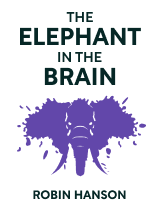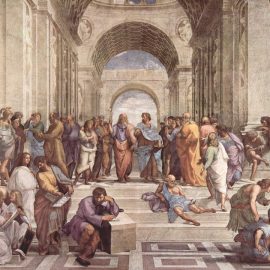

This article is an excerpt from the Shortform book guide to "The Elephant in the Brain" by Robin Hanson and Kevin Simler. Shortform has the world's best summaries and analyses of books you should be reading.
Like this article? Sign up for a free trial here .
Why did social norms develop? How do they work, and what role do they play?
If you make too much noise in a library, you probably won’t get escorted out by security. Instead, you’ll likely earn some dirty looks or shushing from your fellow patrons. Kevin Simler and Robin Hanson explain how norms of society, such as this example of group enforcement, regulate human behavior.
Read more to learn how norms of society play a role in our lives.
Norms of Society
Human cultures regulate selfish behavior and competition with norms—which are the rules and standards of a society. Sometimes they’re codified as laws and enforced centrally, but, most often, norms of society are collectively enforced by the group as a whole.
Simler and Hanson explain that this group enforcement prevents any one individual from dominating the group. They point out that egalitarian early humans needed order without authority—norms of society evolved to meet this need by distributing the task of enforcement among the group. The authors point out that, even in authoritarian societies which do revolve around a central leader, norms are still often enforced by society as a whole via a “cult of personality.” In these environments, speaking out against the leader won’t just result in punishment from above—it’ll also earn you censure from your peers (we’ll explore this more in a moment).
In short, norms of society teach us to regulate each other and to punish unwanted behavior with consequences ranging from eye rolls to gossiping to open violence. Perhaps more to the point, norms teach us to regulate ourselves. If we’re always concerned with what others will think, we have reason to follow norms (at least publicly) to make good impressions and avoid punishment. Moreover, we’re aware that failing to follow norms means forfeiting the social games that norms govern—and missing out on the rewards of those games. In other words, ignoring norms makes you a less attractive partner to others, which means you have less of a chance of finding mates, friends, and allies.
| When Norms Create (Rather Than Resist) Autocracy Simler and Hanson argue that norms of society evolved as a way for humans to govern themselves while avoiding the need for a central authority. But in the contemporary world, norms seem more and more to be at the heart of authoritarian control. For instance, though Simler and Hanson imply that the cult of personality is a product of dictatorial rule—their examples are Mao Zedong’s communist China and Steve Job’s tenure at Apple—this dynamic has in recent years emerged even in democratic systems. For example, historian Ruth Ben-Ghiat argues that leaders like former Italian Prime Minister Silvio Berlusconi and former US President Donald Trump base their power on cults of personality. We can see this dynamic at work, for example, in the way Republican politician Liz Cheney was ejected from her own state party and removed from her Congressional leadership position for speaking out against Trump following the January 6 attack on the US Capitol. The January 6 attack itself also shows how easy it is to exploit social norms. Ben-Ghiat explains that a typical authoritarian strategy is to describe one’s opponents as autocrats and oneself as a champion of liberty and fairness. In other words, by convincing his supporters that Joe Biden stole the 2020 election, Trump tapped into their inherent norms against oppressive authority, which in turn convinced them they were enforcing justice by trying to overturn the election and reinstall Trump. According to Steven Levitsky and Daniel Ziblatt, part of the problem is that democracy itself is based not on laws or constitutions, but on social norms. In How Democracies Die, Levitsky and Ziblatt argue that American democracy is based on two norms: 1) accepting the legitimacy of the democratic system (even when one’s opponent wins) and 2) not using political institutions to marginalize one’s opponents. The authors say that Trump’s administration systematically dismantled both of these norms, thereby paving the way for an authoritarian cult of personality. Taming the elephant: We might not be able to control politicians when they decide to violate political norms, but we can be aware they’re doing so and respond accordingly. If we acknowledge our selfish tendencies and if we recognize how norms of society can be weaponized to support the very behaviors they’re meant to curb, we’ll have a better chance of noticing when someone is trying to exploit norms in order to abuse their power or manipulate us. |

———End of Preview———
Like what you just read? Read the rest of the world's best book summary and analysis of Robin Hanson and Kevin Simler's "The Elephant in the Brain" at Shortform .
Here's what you'll find in our full The Elephant in the Brain summary :
- How human behavior is driven by selfish motives
- Why your own brain is hiding your intentions from you
- Why the purpose of education is to certify future employees






